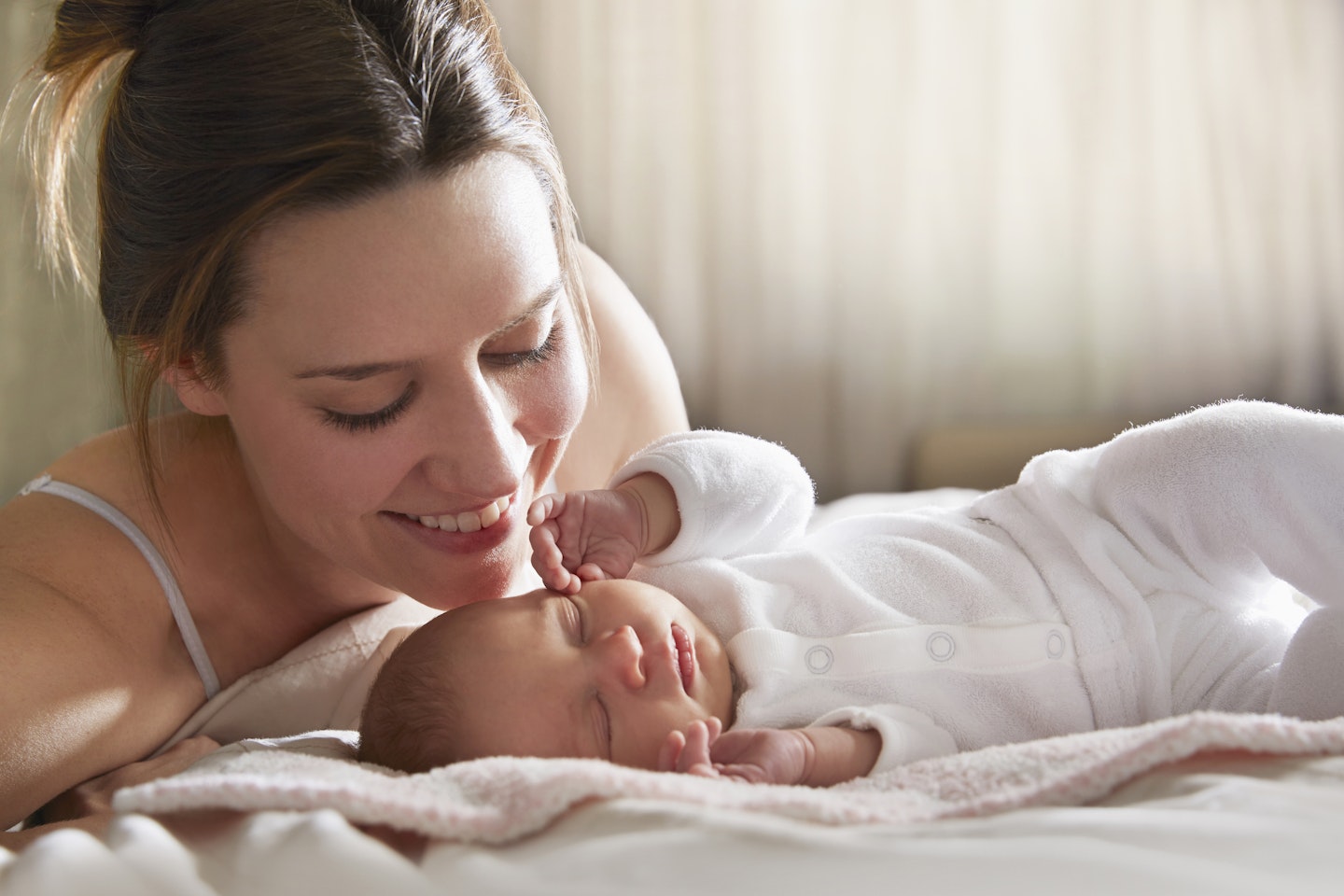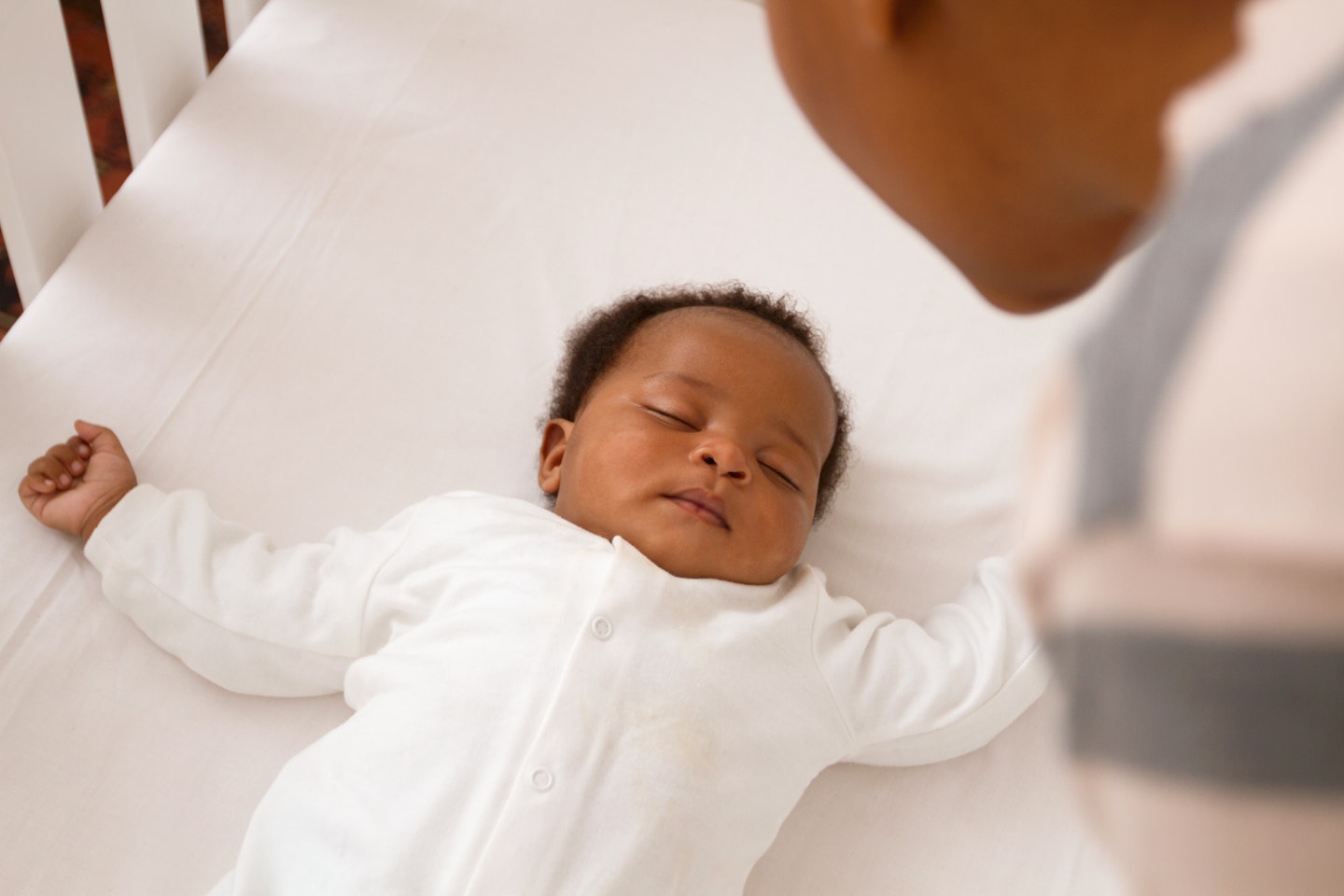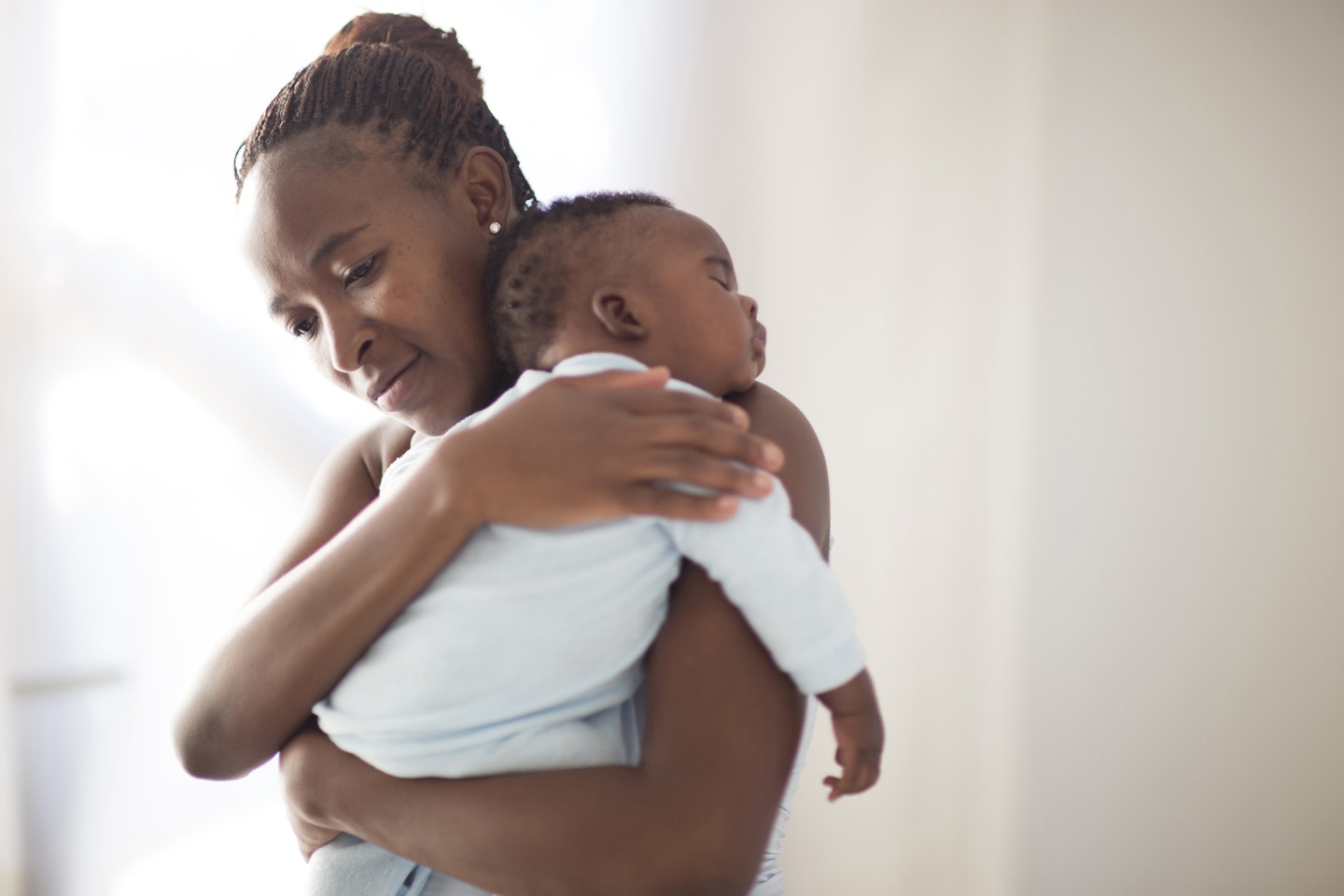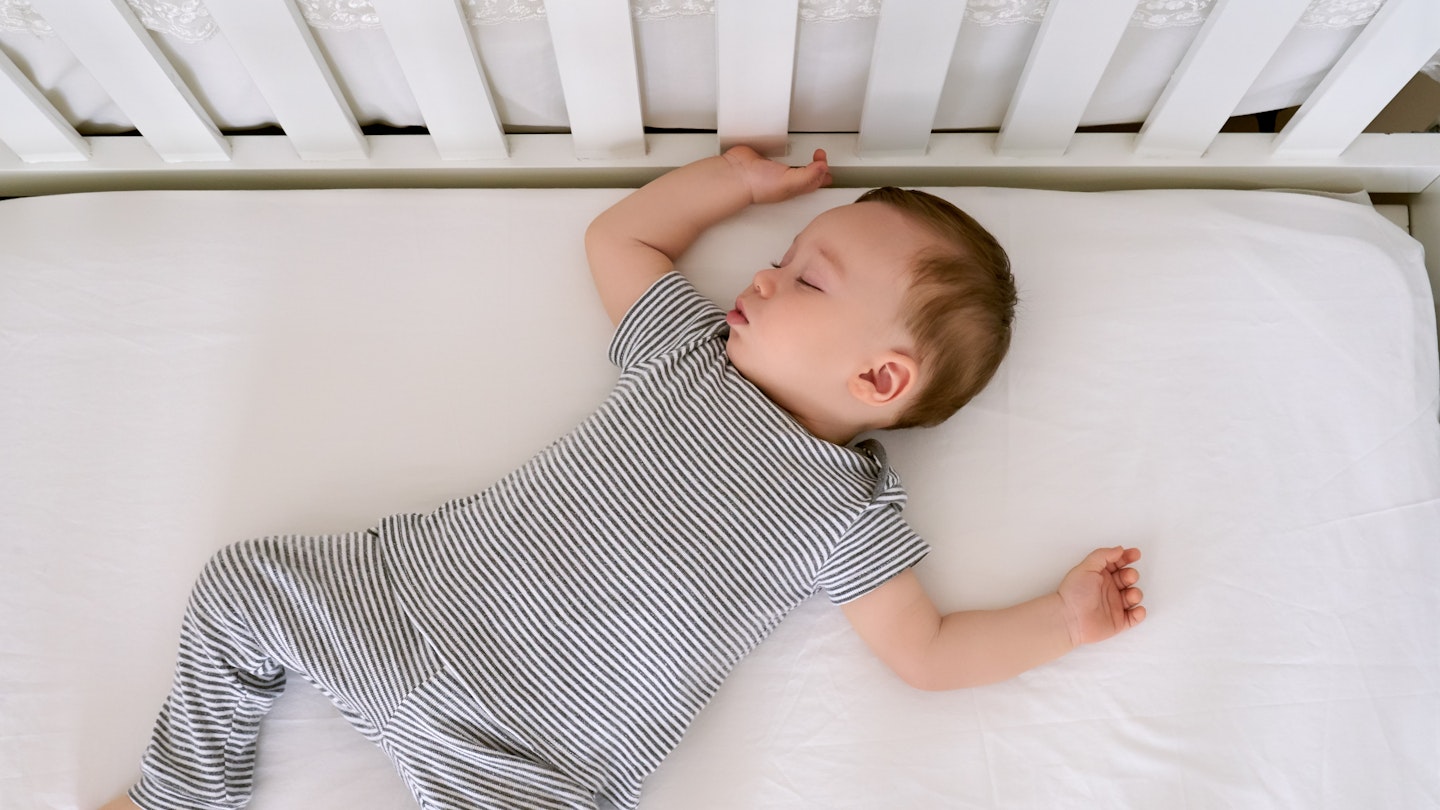For new parents, the question of when do babies sleep through the night is one of the most common concerns, especially if you're struggling to adapt to the lack of sleep.
Especially during those first few months after a baby is born, it's important to remember that it can take time to establish a routine and sleeping patterns, even if you're trying a method of sleep training.
One 2019 study reports that new parents face up to six years of disrupted sleep. So, it’s no wonder you're thinking “when do babies start to sleep through the night?” Even though it seems like you’ll never ever sleep again, you don’t have to retire your sleeping mask just yet.
We’ve got the answer to this question for you, and we think you’ll quite like it!
When do babies start sleeping through the night?

Up until they are around two months old, your newborn baby will wake you up (or perhaps you’ll need to wake the little sleepy-head up) in order to be fed every two to three hours. A newborn can sleep for a maximum of three hours at a stretch without food, so they’ll need to be fed two or three times during the night. Sleep cycles during the night can gradually increase from two months onwards as they can start going longer without food.
By the time baby is three months old, or perhaps even slightly earlier, they can sleep for four to five hours at a stretch. When the baby reaches four or five months, there won’t be any need for a middle-of-the-night feed, and they could well sleep for seven or eight hours at a time non-stop — the dream, right?
According to the National Sleep Foundation, by six months, baby is physically able to sleep a full eight hours non-stop without eating.
When you’ve finished your little happy dance, read on. Just because your baby can technically sleep through the night, unfortunately, that doesn’t necessarily mean that they will. There are many reasons that a child older than six months may wake up in the night.
For instance, they might not be hungry during the night, but are you hungry when you snack on popcorn while watching a film? No, it’s for comfort and enjoyment.
Similarly, a baby loves feeding time with you; it’s one of their favourite things in the world! When they wake up in the middle of the night, they tend to have one thing, and one thing alone, on their little mind; comfort grub!
It’s safe to say that you shouldn’t really expect to be able to sleep much during the night with a baby under six months (although there are a lucky few!), but after six months, there are some steps you can take so you can eventually get some much-needed shut-eye, and for your baby to start enjoying sleeping through the night too.
How much sleep do babies need?

In order to have a better idea of when your child could start sleeping through the night, it’s important to get to know a baby's sleep cycle and how much sleep your baby needs during the day and at night-time. According to Stanford Children’s Health, babies should be sleeping, on average this many hours at night:
Newborn: 8-9 hours per night
1 month: 8-9 hours per night
3 months: 9-10 hours per night
6 months: 10 hours per night
9-18 months: 11 hours per night
18 months: 11 hours per night
24 months: 11-12 hours per night
And this is how many hours baby should be getting through the day:
Newborn: 7-8 hours per day
1 month: 7 hours per day
3 months: 4-5 hours per day
6 months: 4 hours per day
9-18 months: 3 hours per day
18 months: 2.5 hours per day
24 months: 1-2 hours per day
These hours indicate a total and don’t necessarily mean uninterrupted sleep. Of course, every baby has different sleep schedules, and some could start sleeping for longer stretches or less, sooner or later than what is the average, and this is not disconcerting, as long as it’s not too far off from the above ranges. If your child is sleeping a lot more or less than the average, consult your GP.
What can prevent babies from sleeping through the night
As well as waking due to hunger and feeding time, there are a few different things which can cause your baby to wake up in the night.
Temperature – if the room is too hot or too cold, it may wake baby up. This can particularly effect babies in the hot summer months when our rooms are difficult to cool down. Before putting baby to bed, make sure you've dressed your baby for bed appropriately, taking into account the weather and temperature forecast for the night.
Separation anxiety – It's a natural response for babies to feel fearful of being away from their parents, so if they do cry after being put down for bed it's often best to comfort them with a touch of their head or some soothing word until they settle so they know you're nearby.
Environment – it's best to keep their room as dark as possible to avoid waking them. If you do need some light for night feeds or so you can easily check on baby, it's a good idea to use a baby nightlight in the room.
Co-sleeping – whether you're co-sleeping because you feel it's the right choice for you or you find yourself accidentally dozing off, co-sleeping can cause your baby to stir in the night and also increase the risk of SIDS.
When to speak to a GP or professional about baby sleep concerns
Brief changes in sleep patterns are very normal. For example, if your baby has been poorly or if they're a bit jet-lagged or if the climate has changed, can impact baby's sleep for a short period.
If you notice a change in how much sleep your baby is getting, whether it's too much or not enough, then it's a good idea to contact your GP. It's also advised to keep track of your baby's sleep and a note of all naps and sleep time as well as the things that might impact their sleep to help your GP get a better idea of what might be causing the problem.
How to help baby learn to sleep through the night

Here are eight tired-and-tested ways to encourage your baby to sleep through once they are well past the needing-food-during-the-night stage.
Get baby used to their room
One mistake a lot of new parents make is not getting the baby accustomed to their own bedroom. Come six months, they’ll try to put the baby to sleep in their room and meet great resistance.
If their bedroom is a room that they’ve never really even been in before, it’s logical they won’t have any pleasant memories in there and it could be quite daunting for them, especially if they have separation anxiety.
Even if you co-sleep for the first few months, try to spend time playing and chilling in their room before they make the transition to sleeping there, so that when the time comes to sleep train, they will recognise — and enjoy — their bedroom environment.
Establish a bedtime routine
In addition to a bedtime routine, a standard bedtime is also important for increasing the chances of getting the baby to sleep through the night.
A consistent bedtime can program their body clock and soon, they’ll be the ones reminding you that it’s bedtime.
The Baby Sleep Site suggests that by the time a baby is six months old, up until 10 months old, the optimal bedtime is anywhere from 6:00pm-7:30pm. From 10 months to three years old, the window for bedtime should be 6:00pm-8:00pm.
Minimise anxiety
How would you feel if you fell asleep at home and woke up in Tesco’s? Perhaps you’d be a tad confused. Perhaps your anxiety will start to rise. Maybe you’ll have a full-on meltdown.
Similarly, when your baby falls asleep in your arms and wakes up all alone in a bedroom and surroundings they do not recognise, it’s highly likely to trigger all sorts of negative emotions and separation anxiety. Putting them to sleep in their own room each night will start to pave the way for full nights of sleep in there.
Avoid the light
Try to stay away from night lights, or at least ones that are too bright. When a baby wakes up in the night, darkness helps them understand that it is night time and therefore sleep time.
If they wake up to light, the light receptors in their little eyes will trick their brains into thinking that it’s time to wake up and party!
Keep consistent
Consistency is key for babies and adults alike, so the best way to start getting your toddler to sleep through the night is by choosing a sleep training method that best suits you and your baby — and there are many to choose from — and sticking with it.
Learn about sleep regression
You might have heard by now that babies will have baby sleep regression several times throughout their babyhood. These are instances where their sleep will be thrown off, and even “good-sleepers” may end up turning it all upside down. Get informed about sleep regression so you know what to expect and how you can deal with it when it strikes.
Self soothing
Just like we sometimes wake up in the middle of the night to turn around, get comfortable, or have a stretch, so do babies.
The thing with us is that we’ve learnt to put ourselves to sleep again, whereas babies need to get used to self-soothing and falling asleep again on their own. Unless it’s an urgent cry, or on-going, you don’t need to run to the baby if they wake up and start to whinge a little. It’s highly likely they’ll settle down again and get to sleep all by themselves, and if that happens, you’re on the way to great things!
It’s important to remember that each child is different and you should discuss with your doctor if you are worried about your child’s sleeping habits, or any other questions you may have.
